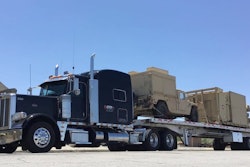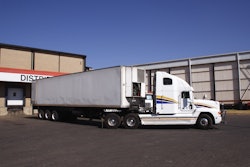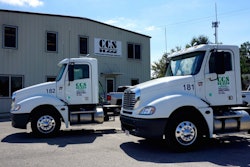Digital freight network Convoy recently released its biannual sustainability in trucking snapshot report that surveyed small and mid-size trucking companies across the U.S. to get a picture of sustainability efforts in the industry.
As fuel prices have risen through 2022, fleets are feeling more pressure to improve fuel efficiency or even look toward alternative fuels to curb rising diesel bills.
Jason and Matt are joined by Kiana Van Waes, Convoy's corporate sustainability analyst, who talks about the findings from Convoy's survey conducted in August, including how fleets view empty miles, climate change, emerging alt fuel technologies, and more.
Contents of this video
00:00 Rising fuel prices and sustainability in trucking
02:15 Empty miles, climate change and alternate fuel technologies
03:18 Fleets’ top reasons for reducing emissions
05:57 Carrier vehicle information
06:42 Alternate fuels
07:47 Small fleets and alternate fuel trucks
Jason Cannon
This week's 10-44 is brought to you by Chevron Delo 600 ADF ultra-low ash diesel engine oil. It's time to kick some ash.
Jason Cannon
How do carriers view sustainability in trucking as fuel presses rise? Hey everybody. Welcome to this week's installment of the 10-44, a weekly webisode from the editors here at CCJ. I'm Jason Cannon and my co-host on the other side is Matt Cole. As a recent American Transportation Research Institute report revealed, fuel prices displaced the driver shortage is the top industry concern among fleets. As a result, carriers are feeling the pressure to find ways to cut down on their fuel bill.
Matt Cole
Digital freight network Convoy recently released its biannual sustainability in trucking snapshot report that surveyed small and mid-size trucking companies across the US to get a picture of sustainability efforts in the industry, We are joined by Kiana Van Waes, Convoy's Corporate Sustainability Analyst, who talks about the findings from convoy's survey conducted in August.
Kiana Van Waes
Sustainability really is core to Convoy's mission, which is to drive zero waste in the transportation industry. There's over 87 million metric tons of wasted CO2 emissions from empty trucks. We've set a goal against avoiding empty miles that flow within our digital freight network. The carriers in our network are a major part of us achieving our goal of avoiding carbon emissions to drive driving efficiencies in our network. We have a unique opportunity as a digital freight broker to be able to engage in conversation with both our carriers and shippers to understand challenges they're facing and bring that knowledge to the other side of the market to share insights.
To do this, every six months, we distribute a survey to the network of carriers that are actively hauling with Convoy to learn about the perception of trucking companies on adopting sustainable technologies and practices, while also understanding the barriers truck drivers are facing when it comes to incorporating sustainability in their businesses. Most recently, in August of 2022, we surveyed 588 small and mid-size trucking companies across the US to collect a snapshot of sustainability in trucking today. The survey participant and owner operators and all of the results were self-reported by the participants.
Jason Cannon
Convoy's carrier survey asked participants about various topics including empty miles, climate change, emerging alt fuel technologies, and more.
Kiana Van Waes
Convoy is in a prime position to learn how carriers are thinking about sustainability, since we're connected to tens of thousands of drivers across the country. We want to ensure their voices are heard, and it helps us to stay on the forefront of the new issues truck drivers are facing, especially as the state of our geopolitical, socioeconomic, and climate state are rapidly changing. Our carrier surveys help us to understand what's important to them today and how they're thinking about everything from empty miles to if climate change is impacting their business, to when they're planning on buying a new truck or what brand of EV or hydrogen fuel truck they're most excited about driving. When we think about sustainability at Convoy, in addition to focusing driving zero waste in transportation, we're also constantly looking for ways to improve the experience of the truck driving profession itself and make it a more sustainable job.
Matt Cole
Another aspect of the survey was to find out Fleet's top reasons for reducing carbon emissions, which was different in the August survey from the one conducted in March.
Kiana Van Waes
We had some super interesting results. One of the key findings of the report were the personal motivations that drive pressures to reduce carbon emissions for carriers. Carriers actually reported awareness of environmental impact of carbon emissions as the top reason for reducing carbon emissions. This actually diverges from earlier this year when we surveyed in March of 2022, where government regulations was cited as the top reason for reducing carbon emissions. This was likely due to the SEC climate disclosure rule being proposed at the time in March of 2022.
Also, as inflation increases and rises and gas prices remain at near record highs, truck drivers are increasingly concerned about their operating margins. We see this when carriers identified that reducing operating costs was ranked as also one of the top reasons for reducing carbon emissions. It had actually increased by 7% compared to our last survey in March. We also saw that carriers who feel pressure to reduce carbon emissions in their business are actually 50% more likely to be tracking or reporting them in their business today.
Jason Cannon
Kiana said Convoy has heard from shippers that carriers aren't willing to provide vehicle information to improve carbon emissions tracking, but the results of the survey tell a different story and we'll hear more about that after a word from 10-44 sponsor, Chevron Lubricants.
Protecting your diesel engine and its aftertreatment system has traditionally been a double edged sword. The same engine oil that is so essential to protecting your engine's internal parts is also responsible for 90% of the ash that is clogging up your DPF and upping your fuel and maintenance costs. Outdated industry thinking still sees a trade off between engine and emission system protection, and Chevron was tired of it. They spent a decade of R&D developing a no compromise formulation. Chevron Lubricants developed a new ultra low ash diesel engine oil that is specifically designed to combat DPF ash clogging.
Delo 600 ADF with Omnimax technology cuts sulfate ash by a whopping 60%, which reduces the rate of DPF clogging and extends DPF service life by two and a half times. Just think what you can do with all the NPGs you're going to add from cutting your number of regions. Delo 600 ADF isn't just about after treatment. It provides complete protection, extending drain intervals by preventing oil breakdown. Before you had to choose between protecting your engine or your after treatment system, and now you don't. 600 ADF from Delo, with Omnimax technology, it's time to kick some ash.
Kiana Van Waes
Another interesting finding is that there's a misconception that we hear from shippers increasingly that they perceive that carriers may not be willing to provide information about their vehicle to improve carbon emissions tracking. However, our survey revealed a really interesting result that carriers are actually willing to provide data to understand their emissions. We saw that 45% of carriers are willing to provide fuel efficiency data of trucks to convoy to track their carbon emissions. Then also, one in five carriers are currently tracking or reporting carbon emissions today.
Matt Cole
With fuel prices being one of, if not the biggest concern for carriers, a growing number are looking at alternate fuels as a possibility with their next truck purchase.
Kiana Van Waes
This should come as no surprise, but fuel economy continues to be a leading concern across the industry when deciding to purchase a new truck. In March of 2022, 82% of carriers listed it as a top concern. Then 80% of carriers listed it as a top concern in August of 2022. No surprise there. Even though many parts of our economy though are tightening their spending, that isn't necessarily what we're seeing with the long tail of carriers. Nearly 70% of survey respondents are planning on buying a new truck within the next three years. What was interesting also, was to see that of that 70% over a third are considering purchasing an alternative fuel truck. The interest is really high for those who are looking to purchase a new truck. Only 23% of respondents said that they have no plans to buy a new truck, which was a 10% increase from the March '22 survey, so likely due to the rising inflation and fuel prices is causing people to have more extreme answers on one side or the other.
Jason Cannon
Convoy's survey targeted smaller fleets and many of those respondents said that cost is a major barrier to purchasing those alt fuel trucks.
Kiana Van Waes
We know electric and hydrogen trucks play a vital role in decarbonizing the trucking industry. There are so many challenges that need to be overcome before we get to widespread adoption, expected in the early 2030s. The most commonly reported barrier to entry in the electric or hydrogen truck market is the cost. More than half of respondents, 54% said that the trucks are simply too expensive to purchase. As we have more conversations with carriers, we actually decided to add in insurance costs as an option for this survey. This actually rose to one of the leading responses, which was the high cost of insuring an electrical hydrogen truck was cited as a barrier 22% of the time. No surprise here, but carriers are still very concerned about the limited charging or refueling infrastructure, tying at 37%. Then also the time it takes to refuel. Last, range anxiety at 32% also remains a very high concern for those in the industry.
Jason Cannon
That's it for this week's 10-44. You can read more on ccjdigital.com. As always, you can find the 10-44 each week on CCJ's YouTube channel. If you've got questions, comments, criticisms or feedback, please hit us up at 1044 [email protected] or give us a call at 404-491-1380. Until next week, everybody stay safe.









